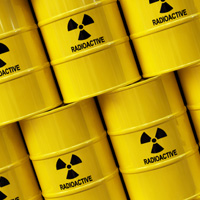Theo Kalionzes and Angela Schlater, Senior Program Officers of Nuclear Challenges, discuss our capstone grants and engagement with the nuclear field as we wind down the Big Bet.
The year 2022 was a deeply challenging one for global peace and reducing nuclear risks. In February, Russia invaded Ukraine and has since carried out a brutal war on the country and made threats to use nuclear weapons. Russia has also overtaken civilian nuclear energy infrastructure in Ukraine, setting a dark precedent of using peaceful nuclear facilities as pawns of war. International governance systems, including the United Nations Security Council, the International Atomic Energy Agency, and beyond, are feeling the full consequences of Russia’s behavior.
But Russia’s invasion of Ukraine has only been the tip of the iceberg. North Korea continues to test missiles, stoking tensions in Northeast Asia and developing its capability to put the continental United States at risk of nuclear attack. The Iran Nuclear Deal, once a promising example of using diplomacy to resolve a nuclear-charged conflict, is now moribund, without a clear path toward resolution, as Tehran violently cracks down on protests and social unrest in Iran.
The work of Nuclear Challenges grantees has been central in building understanding and addressing each of these crises. Amid this turmoil, we are proud to support experts and analysts who are committed to avoiding nuclear conflict and using diplomacy to restore peace. From 2015 to 2020, the MacArthur Foundation provided just over $100 million to the nuclear field as part of our Nuclear Challenges Big Bet. At the end of 2020, we made the decision to end our nuclear grantmaking, but only after we devised a plan to spend an additional $30 million through a capstone project. We made our final grant decisions in June of last year, and the last payments for nuclear funding will go out at the end of 2023.
Our capstone investments have supported work to diversify the nuclear field, strengthen core organizations as we approach the end of our big bet, uncover new ideas that will continue beyond our departure, and spark productive dialogue at the intersection of nuclear energy and climate change.
In 2023 we will focus on engagements with the field, learning, communicating, and celebrating the work of grantees. We will continue to strive to be a productive partner to the individuals and organizations we support, fellow funders, and practitioners in the field through the middle of 2024, when all grant projects will come to a close with the end of the Nuclear Challenges program. Until then, we intend to be fully engaged with the field, and we will continue to support MacArthur grantees in their important work.
Reducing nuclear risk is an existential issue that existed long before MacArthur and will continue beyond the Nuclear Challenges Big Bet. The nuclear field is full of individuals and organizations dedicated to keeping us all safe. We are proud to have supported so many of them throughout our tenure as a funder in this space, stretching back to early days of the Foundation.
Ending nuclear risks will take a global commitment and cooperation from private philanthropy, civil society, and the highest levels of government. We are proud of our 40-year commitment to reducing nuclear risk and stand ready to share knowledge and information with other funders interested in this important work.
Nuclear Challenges grantmaking ›
Nuclear Challenges strategy ›
Other Director's Perspectives ›




